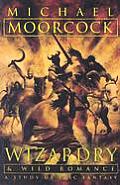Michael Moorcock is a prolific author of fantasy and science fiction, most famously reversals, parodies, and unusual takes on the sword and sourcery genre. He's perhaps best known for his character Elric of Melniboné, but he is also renowned as the long-time editor of the British SF magazine New Worlds. In that role, he fostered the New Wave of science fiction, a conscious attempt to apply more literary techniques to the field and move beyond the standard tropes and patterns. In short, he's experienced, opinionated, and has a history of skepticism towards received wisdom.
Wizardry & Wild Romance is a collection of essays on romantic fantasy (in the old definition of "romance"), particularly the sort where the author invents his own world. Epic fantasy, in other words. Moorcock is clear about not offering a definition or a comprehensive survey. What he offers instead is a discussion of several important elements (setting, character, humor), some history, a discussion of trends and directions, and an essay on why he's not fond of the work of the Inklings (Lewis, Tolkien, and Williams). He closes with a variety of short book reviews of what he considers some of the best epic fantasies.
Stylistically, he's given to long quotes to illustrate his points. This made for a slow start for me, since the early chapters quote extensively from early romantic fantasies where the language requires close attention. He's also prone to a flurry of references that are harder to follow when I'm familiar with only a small portion of the works. I wish he'd provided more of an introduction for the less experienced reader and taken a bit more time to explain the quotes he chose and how they support his thesis. Particularly when comparing writing style, I'm not quite a good enough reader to get more than a glimmering of his point from pure example, and it's rare that he picks apart a piece of prose to show the reader his logic. I missed the detailed examinations done by, for example, Samuel R. Delany.
I think familiarity is the key to getting more out of Moorcock's discussions. As he moves into later essays with a higher prevelance of work I was familiar with, I found it much easier to see what he was driving at. It helps a great deal to have read the work from which he quotes and know the surrounding context and tone. With the context, Moorcock is an able advocate of complex character, rebellion against the status quo, and breaking loose of formula. I didn't always follow why he felt one description was better than another, but when he starts taking apart character and tone, he fills a reader with the desire to read the pieces he's singling out for praise.
The best essay in this collection is "Epic Pooh," his sharp critique of the Inklings and their style of fantasy. I'm mildly surprised by this, given that I'm an unabashed fan of Tolkien, a slightly less enthusiastic fan of C.S. Lewis, and am quite fond of the better sort of epic fantasy in the Tolkein tradition (by Guy Gavriel Kay, for instance). Moorcock is not; he dislikes both Tolkien and his imitators, strongly prefers Mervyn Peake, and finds the tone and subject matter of The Lord of the Rings distasteful. But despite not agreeing with the strength of his feelings, I thoroughly enjoyed reading his critique. Moorcock places different values on elements of fiction than I do, but the flaws that he identifies in Tolkien are certainly present. Tolkien, and Lewis, write fiction that defends the status quo against the outsider, fiction that pits grand virtues against great evil with occasional comic relief but little irony, sarcasm, gallows humor, or other similar ranges of human expression.
I think the strongest points of Moorcock's argument are on the importance of humor and irony and the way in which humor is used as a weapon for change in the world and in a story. His comparisons of children's fantasy authors were also well worth reading. Anyone who recognizes the merits of L. Frank Baum scores points with me, and he also perceptively describes the differences between writing down to children and showing them respect.
The concluding book reviews are brief but good. Moorcock likes absurdist and surrealistic work better than I do, but his review (and other mentions throughout the book) of Mervyn Peake's Gormenghast series is enough to make anyone want to read it.
If you like reading non-fiction about your science fiction, this is an excellent book to pick up. Despite a slow start, it's a good balance of analysis, review, and recommendation, guaranteed to produce some new ideas for your want list and some new perspectives on your reading. Moorcock is opinionated and direct, but polite, respectful, and willing to acknowledge the parts done well even in works he doesn't like. I'm glad there's a vibrant small press in SF these days that can bring niche market books like this to print.
Reviewed: 2007-05-02
